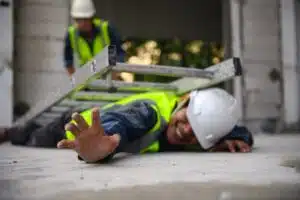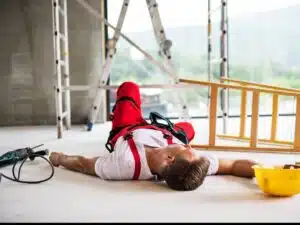After suffering an injury, you may be asking yourself, ‘Can I claim if I’ve been injured by a broken ladder at work?’ This guide could help you with answering this question by explaining the duty of care you are owed while in the workplace and the specific criteria your case must meet in order to have a valid accident at work claim.
After this, we will explain the time limit you must adhere to when starting legal proceedings. This guide will also discuss how personal injury compensation is calculated and the two different heads of loss that you could be awarded and what they compensate you for.
Furthermore, we look at why gathering evidence is an important step in the personal injury claims process, and provide you with examples of evidence that could help support your case. Lastly, we end this guide by discussing some of the benefits of making a ladder accident claim with a solicitor from our panel on a No Win No Fee basis.
If you have any questions about workplace ladder accident claims after finishing this guide, you can contact a member of our advisory team. They can also assess the eligibility of your case and provide you with free advice. To connect with our team today, you can:
- Call 0113 460 1215
- Speak to an advisor using the live chat.
- Complete the contact form to request a call-back.
Browse Our Guide
- Can I Claim If I’ve Been Injured By A Broken Ladder At Work?
- How Long Do I Have To Claim Ladder Accident Compensation?
- How Much Compensation Can I Claim If I’ve Been Injured By A Broken Ladder At Work?
- I Fell Off A Ladder At Work – What Evidence Could Help Me Claim?
- No Win No Fee Solicitors Could Help You Claim Compensation
- Read More About Claiming For Accidents At Work
Can I Claim If I’ve Been Injured By A Broken Ladder At Work?
Employers owe a duty of care to their employees under the Health and Safety at Work etc. Act 1974 (HASAWA). It means they should take practicable and reasonable steps to help ensure that employees are safe from harm whilst doing their jobs.
There are various ways that an employer can take these steps. For example:
- They can ensure that equipment such as ladders and scaffolding are checked regularly for safety and suitability.
- Provide staff with suitable training to complete their duties, such as training on working from a height.
- Perform regular risk assessments and address any hazards they come across.
Additionally, the Work at Heights Regulations 2005 provide guidance on preventing injury at death caused by falling from a height. Furthermore, the Provision and Use of Work Equipment Regulations 1998 (PUWER) requires any equipment provided for work is safe to use, suitable for its intended use and maintained to a safe condition.
However, you may be wondering, ‘Can I claim if I’ve been injured by a broken ladder at work?’. In order to have a valid personal injury claim, you must be able to prove the following criteria apply to your case:
- You were owed a duty of care by your employer.
- They breached their duty of care.
- This breach caused you to suffer injuries.
For example, if your employer provided you with a known faulty ladder to use in your warehouse job, and this ladder broke while you were using it, causing you to suffer a serious back injury when you fell from a height, you may be able to make a claim for compensation.
What Are Common Injuries That Could Be Caused By A Ladder Accident?
Falling from a broken or unsuitable ladder can give rise to a wide variety of injuries. They can range from minor to potentially life-changing depending on the height of the fall. Some examples of injuries that could be suffered include:
- Cuts and bruises.
- Soft tissue injuries and torn ligaments.
- Fractured and broken bones.
- Spinal injury, ligament and disc damage in the back.
- Head injuries, in some cases this could lead to traumatic brain damage.
If you have any questions about claiming compensation for your injuries following a workplace accident, you can contact one of our advisors. They can assess the eligibility of your case and provide you with free advice.
How Long Do I Have To Claim Ladder Accident Compensation?
Under the Limitation Act 1980, you have three years from the date of your accident to begin a personal injury claim. However, certain exceptions apply to this time limit. These include:
- Claimants under the age of 18 – They cannot launch a personal injury claim themselves until the date of their 18th birthday. From which the three year time limit will commence. Alternatively, the court can appoint a litigation friend to claim on their behalf prior to their 18th birthday.
- People who lack the sufficient mental capacity to start a claim themselves – In this case, the time limit is suspended indecently unless they regain this mental capacity. In this case, the time limit will start from the date this mental capacity was recovered. Otherwise, a litigation friend could make a claim on the claimants behalf.
If you have any questions about the personal injury claim time limits, speak to our advisors. They can also inform you whether you still have enough time to begin your own personal injury claim.
How Much Compensation Can I Claim If I’ve Been Injured By A Broken Ladder At Work?
You may also be wondering, ‘How much compensation can I claim if I’ve been injured by a broken ladder at work?’. How much compensation you could receive will be affected by various aspects of your case, such as the type of injuries sustained, their severity and how long they will take to recover.
However, your compensation settlement could be made up of two heads of loss; general and special damages. General damages is awarded in all successful claims and it compensates you for the injuries you have suffered and the pain and suffering they have caused you.
Those who calculate general damages can refer to any medical evidence provided and the guideline compensation brackets listed within the Judicial College Guidelines (JCG). This document lists various injuries along with compensation guidelines.
Within the table below, we have listed some of these guidelines, aside from the first entry. Please only use this table as a guide.
Compensation Guidelines
| Type of Injury | Severity | Award Guidelines | Notes |
|---|---|---|---|
| Multiple Types of Severe Injury with Special Damages | Severe | Up to £1,000,000+ | An award like this reflects multiple severe types of injury with the associated special damage amounts for lost income, medical bills and care costs. |
| Head | (a) Very Severe | £344,150 to £493,000 | Here an ability to follow basic commands remains but there is little sign of a meaningful response to external environment and full-time professional care is needed. |
| Back | (a) Severe (i) | £111,150 to £196,450 | Cases of injuries with the utmost severity to the spinal cord and nerve roots which lead to very serious consequences not typically encountered in back injuries such as incomplete paralysis and impaired bowel, bladder, and sexual function. |
| Back | (b) Moderate (ii) | £15,260 to £33,880 | This award bracket refers to many frequently encountered issues like disturbed ligaments and muscles that causes backache, also soft tissue injuries which speed-up or worsen a pre-existing condition over a period of 5 years or more. |
| Neck | (a) Severe (ii) | £80,240 to £159,770 | Injuries that include serious damage or fractures to the discs in the cervical spine and which create issues like permanent brachial plexus damage or significant loss of movement in the neck and one or more limbs. |
| Leg | (b) Severe Leg Injuries (ii) Very Serious | £66,920 to £109,290 | Injuries that lead to permanent mobility problems and the need for mobility aids or crutches for the rest of the person's life. Also cases of multiple fractures that take years to heal and demand extensive treatment, leaving deformity and limited movement. |
| Knee | (a) Severe (ii) | £63,610 to £85,100 | Leg fractures that extend into the knee joint and cause a constant and permanent level of pain which impairs agility and limits movement making the person prone to osteoarthritis. |
| Pelvis & Hips | (a) Severe (iii) | £47,810 to £64,070 | This bracket covers a wide range of injuries that include fractures to the acetabulum which creates degenerative changes and instability likely requiring a hip replacement in the future. |
| Pelvis & Hips | (b) Moderate (ii) | £15,370 to £32,450 | These cases may warrant a hip replacement or other type of surgery which when carried out wholly successfully tends to attract the upper end of the award bracket. Also includes cases where a hip replacement is indicated for the future. |
| Ankle | (b) Severe | £38,210 to £61,090 | Injuries that require an extensive period of treatment and/or a prolonged period with surgical pins or plaster. Sleep disturbance, scarring and the need for special footwear indicated. |
| Shoulder | (b) Serious | £15,580 to £23,430 | Dislocations and damage to the lower part of the brachial plexus which causes pain, aching and a weakened grip. |
| Elbow | (c) Moderate or Minor Injury | Up to £15,370 | The majority of elbow injuries fall into this category and mainly compromise of simple fractures, cases of tennis elbow syndrome and soft tissue lacerations that which cause no permanent damage and do not permanent impair function. |
Claiming Special Damages
The second head of loss that can make up a compensation settlement is special damages. This compensates the person for the financial harm caused by the injuries suffered. Some examples of financial losses you could claim for include:
- Medical expenses, such as paying for prescriptions.
- A loss of earning for needing time off work.
- Travel costs to and from essential medical appointments.
- Care costs if your required care at home.
You will need documented evidence of these losses to claim special damages. This could include payslips, invoices and bank statements.
If you have any questions about how compensation is awarded in ladder fall injury claims, you can contact a member of our advisory team. They can also offer you a free valuation of your case.
I Fell Off A Ladder At Work – What Evidence Could Help Me Claim?
After suffering a fall from a height in the workplace, it’s important to collect together as much evidence as you can that proves your injuries were caused by your employer breaching their duty of care if you intend to make a personal injury claim.
Some examples of evidence you could collect include:
- Any CCTV footage that captured your accident.
- The contact information of eye witnesses to your accident. A legal professional could collect a statement from them at a later date.
- Photographs of the broken ladder and your visible injuries.
- A copy of your accident report in the workplace accident book.
- Your medical records detailing your injuries and the treatment they required.
A specialist personal injury solicitor from our panel could help you with gathering evidence to support your case as part of their services. To see whether you may be able to work with one of them, you can contact one of our advisors.
No Win No Fee Solicitors Could Help You Claim Compensation
If you have a valid accident at work claim, one of the solicitors on our panel could help you seek personal injury compensation. Additionally, they may offer to represent you under a type of No Win No Fee agreement known as a Conditional Fee Agreement.
With this particular agreement in place, you will not need to pay your No Win No Fee solicitor anything for their services prior to the claim beginning. You also will not need to pay them for their work should the claim fail.
A success fee will be taken from your compensation if your claim is a success. The maximum percentage that can be taken by your solicitor as this fee is capped by the law.
Contact Us About Your Personal Injury Claim
If you are wondering ‘Can I claim if I’ve been injured by a broken ladder at work with a No Win No Fee solicitor?’, you can contact our advisors. They can assess the eligibility of your case and, if it seems strong, they could connect you with a No Win No Fee solicitor on our panel.
To discuss your claim today, you can:
- Call our advisors on 0113 460 1215
- Speak to an advisor using the live chat pop-up.
- Complete the contact form to request a call-back.
Read More About Claiming For Accidents At Work
Some more of our accident at work claims guides:
- This guide discusses slip, trip and fall accidents at work and when you may be able to make a claim.
- Here we explore the main causes of construction accidents and injury.
- This guide looks at whether an employer can sack you after a workplace injury.
Some external resources:
- Information on when you can claim Statutory Sick Pay (SSP) from Gov.UK.
- Guidance on the safe use of ladders and stepladders from the Health and Safety Executive (HSE).
- Guidance on when to provide first aid from the NHS.
We hope that this guide has answered the question ‘Can I claim if I’ve been injured by a broken ladder at work?’. If you would like to discuss your case, you can contact our advisors today for free advice.





